Professional athletes, avid gymgoers, and probably even your grandmother are using fitness trackers: These wrist-worn pieces of tech track different health metrics to optimize performance and even general wellness. Fitness wearables are so popular that the entire industry was estimated to be worth $12.4 billion in 2022. (1)
These devices can track steps, heart rate, sleep quality, and/or heart rate variability. Some can receive calls, send texts, and stream music. That said, not all fitness trackers are made equal. Some are designed with workouts in mind, while others are a bit more practical. Below, we walk you through our list of the best fitness trackers on the market today.
Best Fitness Trackers
- Best Fitness Tracker Overall: WHOOP Strap 3.0
- Best Budget Fitness Tracker: SOUYIE Smart Watch
- Best Fitbit Fitness Tracker: Fitbit Charge 4
- Best Fitness Tracker for Any Workout: Garmin Vivoactive 3
- Best Smartwatch Fitness Tracker: Apple Watch Series 6
- Best Budget Fitness Tracker: Fitbit Charge 3
Editor’s note: The content on BarBend is meant to be informative in nature, but it should not be taken as medical advice. None of these fitness trackers are meant to diagnose or monitor any disease or condition. If you have or feel as though you may have any condition — such as a heart problem — please seek out a medical professional.
Best Fitness Tracker Overall
The best fitness tracker is the one that offers up not just a slew of complete data, but in a digestible way that lets the user understand their metrics. This one even has an app and behavior journal to track all aspects of wellness.
WHOOP Strap 3.0
WHOOP grades how strenuous your workout was, your workout preparedness, and your sleep quality. There’s also the new WHOOP Live, which allows the user to embed their real-time workout metrics onto videos and to share and save. With this tracker, you can chart just about all areas of wellness like sleep, stress, and even caffeine intake making this much more than simply a workout tracker.
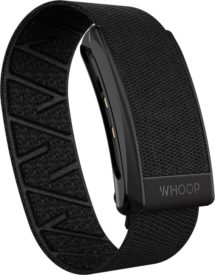
The WHOOP Strap 3.0 is the perfect tracker for the active individual that loves analyzing daily performance and recovery metrics. Use code "BarBend" at checkout to save $30.00!
As a bonus: WHOOP offers five-day battery life and the option to build teams and compete with other members of the WHOOP community. What’s not to like? Well, the $30 per month membership fee can add up, which some people may not like. If you prefer to pay the membership fee yearly or biennially then the price can be as low as about $16 per month.
Who Should Buy WHOOP Strap 3.0
- Extremely active people who want access to in-depth health metrics.
- People who may need a reminder to take it easy (or to turn it up a notch).
- Restless sleepers who may benefit from WHOOP’s sleep coaching.
Who Shouldn’t Buy WHOOP Strap 3.0
- Folks who don’t want to pay a monthly membership fee.
- People who want more than fitness metrics from their tracker.
WHOOP is a step forward in the fitness tracker industry and is reflective of the shift from simply working out to thinking of a more all-encompassing view of wellness. If you want to track many areas of your lifestyle habits then this is the wearable for you.
Best Fitness Tracker on Amazon
One of the most budget-friendly fitness trackers on, the SOUYIE Smart Watch is available right on Amazon for quick and easy delivery.
SOUYIE Smart Watch
The SOUYIE Smart Watch allows you to track your heart rate, sleep, workouts, and more. Plus, you can answer your phone or control your music right from the device.
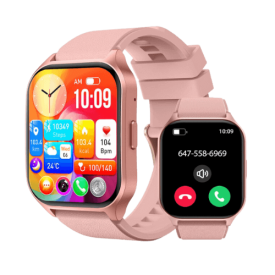
The SOUYIE Smart Watch is among the best budget fitness trackers you'll find. This one tracks all the must-have fitness metrics, including your sleep. Plus, you can answer calls right from your wrist.
Our testers love that this watch is waterproof, so you can wear it in the shower or while swimming laps in the pool. And unlike other wearables that tend to die after a day of wear, this one gives you seven days of usage after a two-hour charge.
Who Should Buy SOUYIE Smart Watch
- Those who want quick delivery through Amazon Prime
- Athletes shopping on a budget.
- Folks who want to track their sleep and workouts.
- Those who want their watch to connect to their phone.
Who Shouldn’t Buy Fitbit Charge 4
- People who want a smartwatch that connects to multiple devices.
The SOUYIE smart watch offers a wide variety of tracking options and you can even get phone notifications right to your wrist. It pretty much ticks all of the fitness-tracker-boxes, and at a budget-friendly price.
Best Fitbit Fitness Tracker
One of the OGs of fitness trackers, Fitbit is known for producing an array of quality, useful products. Their best tracker is also one of their most utilitarian with more features than ever before.
Fitbit Charge 4
The Charge 4 has a bit of something for everybody. This tracker can lead you through guided breathing sessions, set real-time paces and map your runs, track your sleep, and, for women, track menstrual cycles. It also has more general features, such as the ability to download apps, make payments, and stream music.
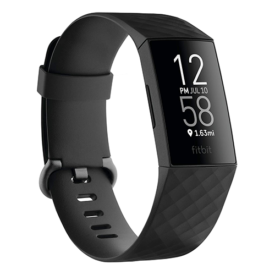
The Fitbit Charge 4 is great for those who want in-depth fitness and workout metrics. It offers sleep tracking, running routes and pacing, guided breathing sessions, and the ability to stream music.
The utility that this device provides is far above and beyond that of a simple step or workout tracker and more akin to a full-fledged smartwatch at a fraction of the price of major competitors. It also looks sleek and doesn’t read like a fitness tracker at first glance, so you can wear it just as comfortably at the gym as at an upscale function.
Who Should Buy Fitbit Charge 4
- Fitness fanatics who want sleep and other metrics, but also with more in-depth cardio and running functions.
- People who also want breathing and stress management guidance from their tracker.
- Those who want a fitness tracker with smartwatch-like functionality will appreciate the features in this device.
Who Shouldn’t Buy Fitbit Charge 4
- People who don’t necessarily need or want in-depth running metrics.
- Athletes and fitness enthusiasts who want more of a pure fitness tracker.
Fitbit has outdone themselves yet again with the Charge 4. The amount of features that have been put in this device while still keeping the cost affordable is sure to make this a shoo-in for your favorite fitness tracker out there.
Best Fitness Tracker for Any Workout
Whether you want to try bodybuilding, increase your one-rep max, or just count your macros and lose a little weight — you want a wearable that can track all of your efforts.
Garmin Vivoactive 3
What makes Garmin’s smartwatch stand out is that it comes with 15 pre-downloaded sports apps, so you can track the pacing, distance, and location of your activity of choice. You can also track your Vo2 max, stress levels, and calorie burn.
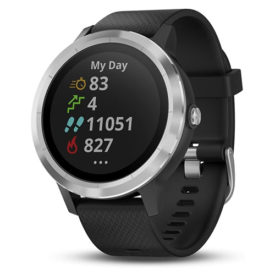
This tracker comes with over a dozen different activities programmed into it, and you can even upload your own custom workouts.
This tracker also comes with the standard accouterments of a smartwatch — apps, contactless pay, customizable watch faces, and it’s waterproof for swimming. The downsides are the battery life is less than other models — 13 hours when using the GPS — and you can’t stream music.
Who Should Buy Garmin Vivoactive 3
- People who like to stay active through multiple sports.
- Those want the options to access apps and pay through their watch.
Who Shouldn’t Buy Garmin Vivoactive 3
- People who want to stream music on their fitness tracker.
- Folka who want longer battery life.
Whether you’re trying to track bodybuilding workouts, map your runs, or chart your daily steps the Garmin Vivoactive 3 is a solid choice with over a dozen pre-downloaded sports apps. It can also track key metrics like stress levels, calories, and VO2 max — making it ideal for athletes.
Best Smartwatch Fitness Tracker
Smartwatches, generally, offer far more functionality compared to a general fitness tracker. Sometimes, this can be at the cost of worthwhile fitness information, but we found a well-rounded smartwatch worth your money.
Apple Watch Series 6
Apple revolutionized the computer, the phone, and now the smartwatch. The health functions alone are tremendous. The sleek Apple Watch Series 6 can take an ECG (electrocardiogram), measure your blood oxygen levels, help you establish a better bedtime routine, and track basic workout metrics.
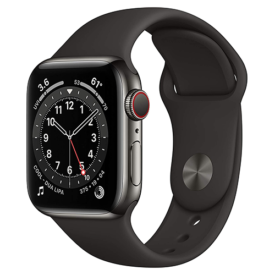
Advanced health metrics — such as ECGs and blood oxygen level — paired with the usual Apple apps (maps, Apple Pay, and Siri), make this smartwatch one of the most complete devices on the market.
With those functions also come the typical array of Apple apps — maps, texts, Siri, and Apple Pay. Of course, all of this comes at a hefty cost of $500. It is also designed and optimized to work with Apple products like iPhones, so if you’re an Android user, you may not have the best possible experience with this device.
Who Should Buy Apple Watch Series 6
- People who want new health features such as access to an ECG or their blood oxygen levels.
- Apple fans who are familiar and happy with the brand’s current host of essential apps (maps, Apple Pay, text, Siri).
- Folks who want a stylish watch.
Who Shouldn’t Buy Apple Watch Series 6
- Penny pinchers, as this watch is $500.
- People who want more robust workout-specific applications and metrics such as recovery and HRV.
- Anyone who doesn’t use iPhones for their smartphones.
If you’re an iPhone user and looking for a fitness tracker, you can’t go wrong with an Apple Watch. The digital infrastructure that Apple has developed to support wellness tracking for their watch is vast with a workout on-demand streaming service, tracking for tons of variables, and intuitive use.
Best Budget Fitness Tracker
A good fitness tracker doesn’t need to be an expensive one. Hone in on your needs, and look for a device that meets them — it won’t be the fanciest piece of tech, but it gets the job done.
Fitbit Charge 3
For just a little more than $100, the Charge 3 tracks your calories burned, resting heart rate, and has a battery life of seven days. It’s waterproof, and you can receive calls, texts, and weather updates on it (though the screen is narrow and small).
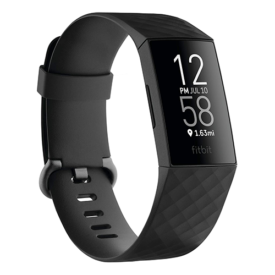
For the money, you won't do much better than the Charge 3. This device tracks the essentials — calories burned, your resting heart rate, and it can hold a charge for seven days.
While this is a great device for the money, you will miss out on in-depth metrics, and actionable advice (which Apple and WHOOP both provide). Also, this tracker is pretty cheap compared to the others making it a great choice if you’re looking to dip your toes in the fitness tracker water without too much commitment.
Who Should Buy Fitbit Charge 3
- People on a budget.
- Those who require very basic fitness and health info.
- Anyone looking for a waterproof fitness tracker will find it here.
Who Shouldn’t Buy Fitbit Charge 3
- Folks who want more apps and metrics from their fitness tracker.
- People who care to own a more aesthetically pleasing watch.
- People who want to text and make calls on the device.
If you’re unsure whether you’re going to be a fan of using a fitness tracker or have the ability to stay diligent with charging and wearing it, then this cost-effective model is likely the right choice. It allows you to test the waters without shelling out a mountain of cash only to find that it’s not for you. The Charge 3 is a solid tracker in its own right too for those on a budget.
Benefits of Fitness Trackers
There are many potential benefits of fitness trackers, but those are dependent on what you’re using them for. Many people use fitness trackers for simple tracking tasks like step counting, heart rate monitoring, and more. Others prefer more detailed tasks, which higher-end trackers can perform — like route tracking for runs, workout tracking, and even acting as an extension of your smartphone. Fitness trackers can be useful in ensuring you achieve your step goals each day and maintain your target heart rate when working out.
How We Chose the Best Fitness Trackers
Fitness bands are inherently personal devices. They can track individual movements, measure calories burned, record heart rates, and monitor sleep patterns. They’re also worn around one’s wrist all day, every day. As a result, you want a device that looks as good as it performs, and that can keep up with your activity level. Here’s what we considered when cultivating the picks above.
Style
Fitness trackers sit on your wrist 24/7. They’re no longer novelty items worn by the wealthy or fitness-crazed. Like a traditional watch, these bands are a statement piece that will be seen by the people you meet for dates, for job interviews, and fellow gymgoers who watch you rep out pull-ups. For that reason alone, the style and design of each fitness tracker may be one of the key determining factors for many users.
The devices themselves typically have a small “face” and a standard band. The faces of these devices can have different visual screen options, but the main aspect of the tracker that will stand out is the band. The more prominent brands have loads of options, from leather to woven and even metal bands. This is where customers can find a way to make their fitness bands match their aesthetic.
App compatibility
The functionality of these fitness trackers is mostly determined by the different applications that they are compatible with. Some manufacturers also design proprietary apps that track, graph, and map fitness data — such as step counts, calories burned over time, and routes of favorite running paths. In other words, apps enhance your fitness tracker experience.
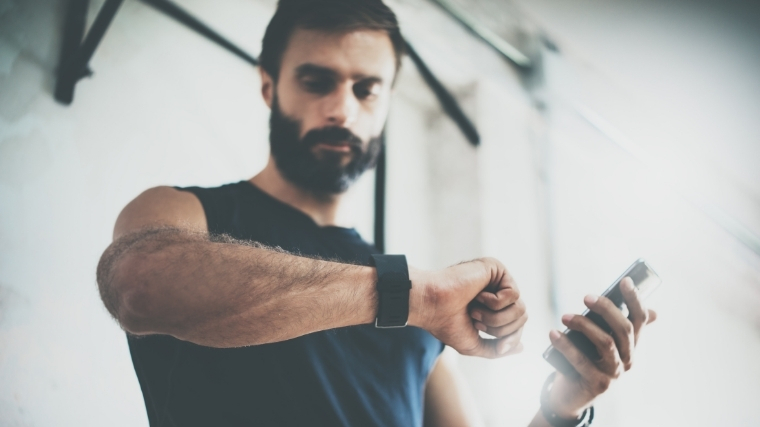
Other apps include streamed workouts, such as Apple’s new Fitness+, and communities, like the one offered by WHOOP, where users can challenge and motivate friends while trying to climb to the top of individual leaderboards. There are also fitness trackers that aren’t beholden to one app and can be synced to several different options. If you already have favorite fitness or sleep tracking apps, make sure they are compatible with any potential purchase.
Cost
Depending on the brand, fitness trackers can cost anywhere from around $100 up to half a grand. Those who want the basics can safely opt for the more affordable options, as these have functionality that should satisfy most users. The more expensive devices possess extra features such as more robust metrics, an extensive selection of apps, and the ability to text, call, and make contactless payments.
Durability
To indeed be considered a dependable fitness tracker, the device will need to withstand everyday use. If it fails to do so, it will be losing critical data that the athlete (casual or professional) may help track specific fitness goals.
You want a tracker that is waterproof or, at the very least, water-resistant. This way, you can use it while swimming or running in the rain. And if you forget to remove your tracker before taking a shower, it’s not an issue. Another critical aspect of durability is the device’s battery life. You don’t want to charge your tracker every day, as you may forget and then neglect your device overall.
How Much Do Fitness Trackers Cost?
Fitness trackers have a reputation for being either extremely cheap and breaking easily or exorbitantly expensive — preventing many people from considering them. They’ve come a long way, and you can now purchase very high-quality and reliable devices for rather affordable prices, though more comprehensive trackers still cost more.
| Best Fitness Tracker Overall | WHOOP Strap 3.0 | $30.00 for the device with required membership starting at $15.93 per month |
| Best Fitness Tracker on Amazon | SOUYIE Smart Watch | $99.99 |
| Best Fitbit Fitness Tracker | Fitbit Charge 4 | $149.95 |
| Best Fitness Tracker for Any Workout | Garmin Vivoactive 3 | $249.99 |
| Best Smartwatch Fitness Tracker | Apple Watch Series 6 | Starting at $359.99 |
| Best Budget Fitness Tracker | Fitbit Charge 3 | $139.99 |
You can pick up fitness trackers for pretty cheap, but some of the more inexpensive ones may require a monthly subscription — so they’re cheaper up front but end up costing more over time. You can pick up a fitness tracker for as little as about $30 with subscriptions costing anywhere from $15 to $30 per month. On the higher end, prices can go up to around $250 or even $360 for more intricate and multi-faceted ones.
What to Consider Before Buying Fitness Trackers
Not sure which fitness tracker is right for you? Here are some questions to ask yourself that may help guide your purchase.
What type of exercise do you do?
If you are a swimmer, then obviously, there needs to be some level of water resistance to your fitness tracker — this also applies to those who run, rain or shine, and forgetful folks who may take a shower with their band on.

Or, if you’re a lifter who is constantly grinding through tough training splits, make sure the fitness tracker and the corresponding app can track that specific type of exercise. Certain activities like golf and weightlifting are noticeably absent from some fitness trackers’ capabilities though that is changing.
Which metrics are most important to you?
Some customers may be shopping for a fitness tracker to monitor their heart rate while working out. Others may want an in-depth review of their sleep patterns, workout performance, and recovery ability. But remember, the more data analyzing tools and social compatibility desired, the more expensive the fitness tracker will be.
Are you comfortable with watches?
You’re going to be wearing this device a lot, like probably all of the time. That said, you need to assess if you’re more comfortable with a smartwatch, which is generally a bit snugger, or a fitness tracker, which have softer, silicone bands. It’s a small detail, but one that will determine how often you use your tracker.
Final Word
These trackers have evolved over time from what was once an expensive and obscure novelty item to commonplace. They’re now as common in the gym as they are in professional settings as fitness culture has become more pervasive. The market has become much more competitive and trackers are now rather affordable for nearly anyone who wants to add them to their wellness routine.
Fitness trackers are a great way to potentially keep yourself on track with steps, sleep, and more with built-in sensors. Not only can you track the simple things but more complex data like heart rate and some can access the GPS data of the device it’s connected to for run mapping. Certain devices have the ability to download apps, stream music, and more capabilities that are more akin to full-fledged smartwatches.
FAQs
What is the best fitness tracker?
With so many options in a flooded market, it can be difficult to discern the right tracker for you, which is why we wrote this list. Our favorite fitness tracker at the moment is the WHOOP Strap 3.0. The upfront cost is very low at around $30, though there is a monthly subscription fee. It can track a ton of important metrics including the usual suspects, like heart rate and steps, as well as others like stress, caffeine intake, and sleep.
How much do fitness trackers cost?
Fitness trackers can range rather widely in price depending largely on the peripheral features that they have. Some of the more cost-effective ones can be as little as $30 while the more expensive ones can cost upwards of about $250 or $360. We should mention that some of the very inexpensive trackers may require a monthly or yearly subscription fee to realize their full potential usefulness.
Should I wear my fitness tracker all the time?
For the most accurate results, you’ll want to wear your tracker as much as you possibly can. Unless you’re going into the water with one that isn’t waterproof or otherwise engaging in an activity that would make wearing it uncomfortable you may want to keep the tracker on all the time if possible.